Forgotten Films: The Point
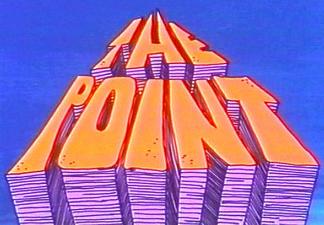 Harry Nilsson was firmly established as a talented songwriter by the early 1970’s with a significant number of his compositions covered by everyone from Glen Campbell to The Monkees. His success as a singer was still developing and even though he had released five albums by this time, none of them had been particularly well received either critically or financially. In a rather strange move given the current state of the world and Nilsson’s own unrealized artistic aspirations, he went off in an almost uncharted direction and created a musical fairy tale for his sixth album.
Harry Nilsson was firmly established as a talented songwriter by the early 1970’s with a significant number of his compositions covered by everyone from Glen Campbell to The Monkees. His success as a singer was still developing and even though he had released five albums by this time, none of them had been particularly well received either critically or financially. In a rather strange move given the current state of the world and Nilsson’s own unrealized artistic aspirations, he went off in an almost uncharted direction and created a musical fairy tale for his sixth album.
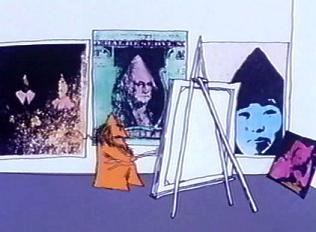 The Point originated in Nilsson’s general dissatisfaction with the lack modern fairy tales for children and with his loves for puns. Almost everything in the story, including its very title, is play on the philosophy that everything must have a point. Initially Nilsson fashioned the tale into a recorded album, providing the story’s narration himself and singing several songs at various intervals. The album was quickly followed by a television movie that was broadcast as an ABC Movie of the Week in February of 1971. While Nilsson’s story was retained almost completely intact along with his music, his narration was omitted in favor of a framing device where a father (originally voiced by actor Dustin Hoffman) is telling the tale to his young son as a bedtime story. In addition to padding the running time, these new segments also allowed for some social commentary on how television, the very medium on which the movie was being broadcast, was responsible for children losing the ability to visualize things with their imaginations.
The Point originated in Nilsson’s general dissatisfaction with the lack modern fairy tales for children and with his loves for puns. Almost everything in the story, including its very title, is play on the philosophy that everything must have a point. Initially Nilsson fashioned the tale into a recorded album, providing the story’s narration himself and singing several songs at various intervals. The album was quickly followed by a television movie that was broadcast as an ABC Movie of the Week in February of 1971. While Nilsson’s story was retained almost completely intact along with his music, his narration was omitted in favor of a framing device where a father (originally voiced by actor Dustin Hoffman) is telling the tale to his young son as a bedtime story. In addition to padding the running time, these new segments also allowed for some social commentary on how television, the very medium on which the movie was being broadcast, was responsible for children losing the ability to visualize things with their imaginations.
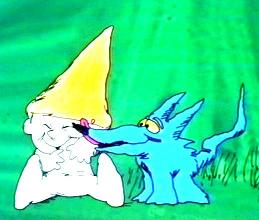
A boy and his dog: Oblio and Arrow.
Both the album and the movie version of The Point tell the story of a fantasy kingdom where everything must have a point. All of the buildings and everything manufactured or created is pointed. Even the people and the animals that live in the kingdom have points on the tops of their heads. Into this world is born a round headed boy who is named Oblio by his perfectly normal pointed parents. Oblio’s mother makes him a pointed cap and he is accepted by the townspeople since he is otherwise a perfectly happy and well mannered child. One day though Oblio calls attention to himself when he humiliates the son of a powerful official known as the Count by beating him at the popular game of triangle toss, with a little help from his dog Arrow.
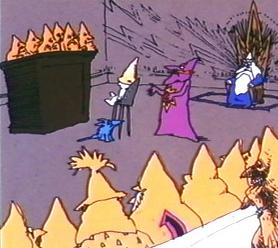
The point is Oblio has no point!
To save face and punish Oblio for disgracing his son, the Count has him put on trial for violating the most sacred law of the kingdom by not having a point. The townspeople and the king all like Oblio and are upset at having to prosecute him but they feel that ultimately they must uphold the law. The Count manages to coerce a jury into finding Oblio guilty and the only fitting punishment for not having a point is banishment to the Pointless Forest which borders one side of the kingdom. The following morning, Oblio and Arrow, who has been deemed an accomplice to a pointless person, are marched to the edge of the kingdom and banished by the townspeople with much sorrow.
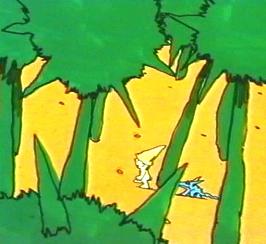
Banished to the Pointless Forest.
As soon as Oblio and Arrow enter the Pointless Forest they realize it is anything but pointless. On their journey they meet the Pointed Man (who points in all directions at once which he readily admits is no direction at all), three bulbous dancing sisters, a hip rock man, and creature made entirely of leaves. While many of these inhabitants have no obvious points on their bodies, they still have a point to what they do and why they exist. Even the very trees of the forest and every one of their leaves have a point to them. After escaping from a swarm of giant bees (who have some very nasty points!), avoiding a bottomless pit, and spending the night in the dark forest, Oblio and Arrow discover themselves on the other side and find the way back home.
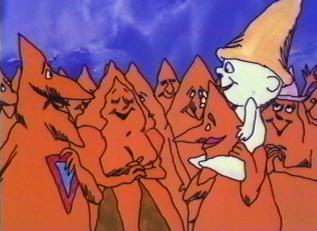
Oblio returns to a hero's welcome.
During Oblio’s absence from the kingdom, the people had become increasingly distraught over their decision to banish him so when word of his approaching return spreads they turn out to give him a hero’s welcome. Oblio tells the people of his adventures and how he learned that everything in the world has some kind of a point so he must have one too. The crowd is amazed that a young child could survive in the forest and are just happy that Oblio is back safe but the Count still insists that he is breaking the law. When he removes the boy’s cap to make his point, the Count and the people see that Oblio now truly does have a pointed head but before they can congratulate him, the heads of all the townspeople turn round! All except the Count’s that is who fleas in shame when his perfectly pointed head just droops to one side. In the end, everyone learns the lesson that a point need not be a physical manifestation in order for someone or something to have one and, as is usually the case in the best fairy tales, everyone lives happily ever after.
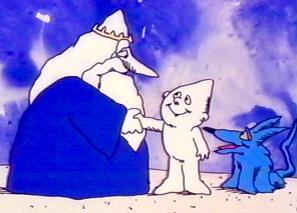
Oblio gets the point!
The television movie version of The Point was directed by Fred Wolf, whose fluid style of animation had graced a number of shorts, television specials, and commercials, and created at his production studio in Ireland. For some strange reason, Dustin Hoffman’s contract only included his voice being used in the initial broadcast of the film. For subsequent network showings and later syndication sales, other actors, including Alan Thicke, were used to redub his dialogue. When the film was eventually released on home video, it was redubbed for a final time with former-Beatle and long time friend of Nilsson, Ringo Starr, providing the voice of the father. Other voice actors included the well known (or at least well heard) Paul Frees and Lennie Weinrib plus Bobby Brady himself, Mike Lookinland, providing the voice of Oblio.
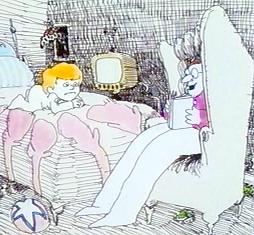 Because of its 74 minute running time, to fit in a standard 90 minute movie time slot with commercials, The Point did not receive a lot of air time after its network broadcasts. It was picked up for screening in the early days of pay cable services which exposed it to only a limited the number of viewers and then finally released on home video in the 80’s. The story was later adapted into a popular musical stage play that eliminated the narration and instead filled out the story with additional songs by Nilsson. The most popular song from the album, Me and my Arrow, was later used as a car commercial theme for the Plymouth Arrow. The Point may have never achieved the cult status it deserves but it is certainly worth a look and without at least one viewing, no fan of obscure films can truly consider themselves well rounded!
Because of its 74 minute running time, to fit in a standard 90 minute movie time slot with commercials, The Point did not receive a lot of air time after its network broadcasts. It was picked up for screening in the early days of pay cable services which exposed it to only a limited the number of viewers and then finally released on home video in the 80’s. The story was later adapted into a popular musical stage play that eliminated the narration and instead filled out the story with additional songs by Nilsson. The most popular song from the album, Me and my Arrow, was later used as a car commercial theme for the Plymouth Arrow. The Point may have never achieved the cult status it deserves but it is certainly worth a look and without at least one viewing, no fan of obscure films can truly consider themselves well rounded!
